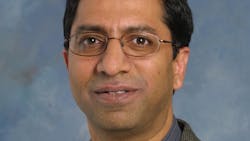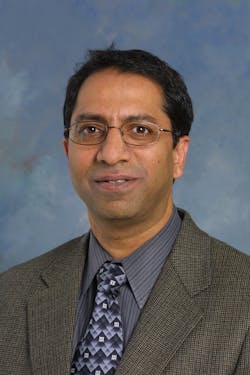Mani Vadari: ‘Make Things Real’
Dr. Mani Vadari’s experience has taught him two things: The first is to make things real.
“By this, I mean the need to bring students out of the academic or theoretical world into real life. This translation would force them to focus on the problem that is more critical vs. solving a problem just because it is there,” he said.
The second major thing Vadari has learned is that solving the technical problem is only half the solution. Thinking through the people (who need to use this technology) and the process (how this technology will be used) can sometimes be more important, he said. “So, when a problem is being solved or a new technology is being developed, one needs to think through all the people, process and technology aspects of the solution.”
His book, Electric System Operations – Evolving to the Modern Grid, has been trending to five stars on Amazon.com. “This is the first and only book to discuss electric system operations from a very practical point of view, including describing some of the key systems commonly used to support electric system operations,” Vadari said. Also see Vadari’s article on utility skillsets on tdworld.com.
On the training front, his company has developed training content from four to 16 hours for more than 25 topics, ranging from general power systems components, utility fundamentals, and smart grid dimensions to utility transformation. These courses can be delivered either on an online, self-paced mode or an instructor-led classroom mode. The courses can be customized to suit the needs of any client worldwide. The latest undertaking is the development of a 6-month certificate course on Smart Grid and Utility transformation being developed in collaboration with IEEE.
Vadari’s past roles have been as VP of Infrastructure at Battelle Memorial Institute, Partner and Global lead for System Operations and Smart Grid at Accenture, Lead engineer at Alstom Grid, and Adjunct Professor at the University of Washington in Seattle. At the Smart Cities Council, Vadari is responsible for producing Smart Cities Readiness Guide workshops and providing city assessment and other related Smart Cities services. Vadari has also published over 50 articles and several blogs on subjects ranging from electric system operations to smart grid to big data and the Internet of Things.
T&D World discusses his experience, career choice and the importance of training the next generation of power system engineers:
Q: How does your current position help you in teaching courses or in writing about skillsets—and how does your past experience help you in this role?
I have almost 30 years of experience in this industry – in different companies and different roles all covering a broad range from technical software development to management consulting. This makes for a very unique combination of technical depth and management consulting breadth that is rare in our industry.
In one of my early jobs developing software for transmission level control centers, I spent several night shifts at a utility control center. Given that not much happens in the night shift, the operators love to talk and were very eager to share their knowledge with me. I learned much about utility operations that validated much of the software that I was helping to develop. These experiences have enabled me to deliver training with a very realistic and practical bent that is generally missing in most other training curriculum.
Q: When and why did you decide to go into power systems?
I guess, I was always destined to be a power system engineer. Right after I was admitted into the engineering college, I got the bug. I followed that bug all the way to a Master’s and Ph.D in Electrical Power Systems Engineering. Twenty-five years after my Ph.D, my passion stays true.
Q: Best thing about your job right now?
The best thing about my job right now is the broad level of flexibility I have both with the use of time and the kinds of projects I can work on. It has allowed me to work on highly strategic projects such as the REV initiative in New York, developing the grid modernization plan for Dubai and other similar projects. It has also allowed me to develop a top-notch training program that is being delivered to vendors, utilities and cities around the world. The training deliveries whether online self-paced or instructor-led, have all received 5-star ratings from the attendees.
Q: Why is training power systems engineers important to the industry?
This is the golden age of the power system engineer. The 18th and 19th century saw the full bloom industrial revolution. The early half of the 20th century, we had the automobile industry in bloom. Then came computers, the internet, and information and others. The next 50 years will be focused on energy. While there are several aspects of energy that will be focused on by a lot of other capabilities, it is the power system engineer who has the responsibility of bringing it all together.
However, this is very different from the ones of the past. The new breed of power system engineer will need to know and understand everything from the past (start with Maxwell’s equations and all the way to power flow and so on) but also need to understand the various dimensions of the smart grid, and use a combination of business and technical skills to STILL deliver the most reliable and most critical commodity to where it is needed ALL in real-time.
Q: What do you like to do in your spare time?
I like to do social service in my spare time. With respect to this interview, the one that I am most proud of is my quarterly newsletter “The State of the Smart Grid.” This newsletter has grown from about 60+ subscribers for the first newsletter to crossing over 1000+ subscribers for the 8th newsletter. I believe the main reason for the success is due to the unbiased nature of the news segments used and the original articles that are written specifically for this newsletter. This newsletter is my pride and joy and is my way of paying something back to the community. Several people have sent very complimentary comments back to me after reading the newsletter.
Q: Anything else you would like to add about your teaching philosophy?
My teaching philosophy extends to mentoring high-school students. Just this past summer, I started an internship program for high-school students and we were able to place seven kids in various organizations ranging from University of Washington, a local high-tech startup and others. I feel serious about empowering high-school students who would then become high-achievers in college and productive citizens in life.
Vadari is also one of T&D World's "Xperts" on our IdeaXchange forum.

